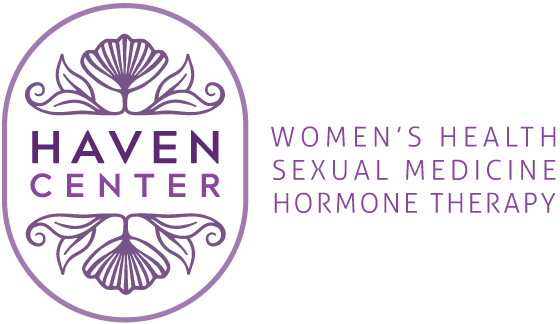Conditions We Treat
Our Areas of Expertise
Haven Center provides the most innovative and state-of-the-art treatments for a wide variety of women’s health issues, with a special focus on sexual health and hormones. Reach out today to schedule your appointment.
Click on buttons below to view more info on each condition we treat or service we offer.
Women’s Health
Women’s health not only encompasses routine care for the whole woman, but also includes diagnosis and management of problems related to the female reproductive system. While most women’s health visits in the United States last between 10-15 minutes and are uncomfortable at best, at Haven Center we pride ourselves on providing an unparalleled, comprehensive healthcare experience, no matter what the reason for your visit may be.
Trauma-informed Care
We recognize that past experiences may have a long-lasting effect on mental and physical well-being. Trauma is associated with many sexual conditions and may contribute to vulvovaginal disorders as well. As such, we utilize traumasensitive language and trauma-informed care principles throughout our practice.
Well-Woman Exams
A well woman exam, or annual exam, is a general health screening exam recommended for women 18 and older. This appointment usually includes a full physical evaluation, including a breast exam and possibly a pelvic exam depending on the patient’s age. During this visit, diet, exercise, lifestyle choices, medications, and other complaints such as menstrual problems or sexual issues, will be addressed, and further appointments may be scheduled to delve deeper should any of these topics be problematic. At Haven Center, we pride ourselves on making well-woman exams as comfortable and atraumatic as possible.
Pediatric and Adolescent Gynecology
Pediatric and adolescent gynecology refers to the medical and surgical management of gynecologic concerns in patients under 18 years of age. It requires specialized evaluation and examination techniques to reduce the possibility of trauma associated with a gynecologic exam. Not only is our office uniquely suited to ensure that even the youngest patients feel comfortable and receive the highest level of care, but we are the only gynecologic provider in the region to offer multiple forms of adjuvant pain and stress-relieving therapy.
Sexual Medicine
Approximately forty percent of American women experience some form of sexual concern during their lifetime. This is more than the number of men, women, and children with all types of diabetes combined! Unfortunately, this common condition often goes underreported and undiagnosed. Regardless of the cause or type, you don’t have to suffer! At Haven Center, we can help you feel better.
Vulvovaginal Disorders
The term vulvovaginal disorders refers to a series of conditions that affect the tissues of the vulva (external genitalia) and the vagina (internal genitalia). These conditions may be inflammatory, infectious, or reactive in origin. Although they are very common, vulvovaginal disorders are frequently misdiagnosed. They can range from mild to severe, and encompass a variety of concerns from yeast infections to gynecologic cancers.
Hormone Therapy
Did you know that in the United States alone, over half of the entire population uses some form of hormone therapy? At Haven Center, we believe in an individualized approach to hormone therapy, basing our recommendations off of your specific health goals, preferences, and laboratory findings as well as the most current clinical guidelines from specialty medical societies.
“Gosh how do I start…
Dr. Babb saved my life. I was in chronic pain due to Hormonally mediated vestibulodynia and every doctor I went to didn’t know what it was… or they told me I was having an allergy. I was deeply depressed. My regular gynecologist gasped at giving me HRT (testosterone being the main component that I needed). Dr. Babb not only KNEW what was happening to me, he was the first doctor to say “I stand with you and you are not alone in this.”
I have continued to share his information with others, and although I flew from states away, it was worth every penny.”
